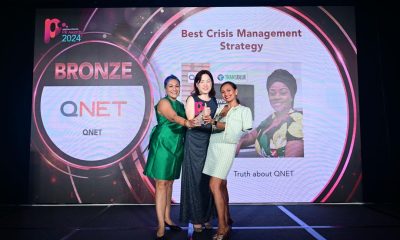Banking and Finance
Financial independence and the monster of lifestyle inflation

I am of utmost certainty that everyone would love to be financially independent. A resounding ‘yes’ is the answer I would get if I were to go round asking “who wants to be independent financially?” Such is the burning desire!
Financial Independence simply means one would have gotten to the point where he or she would not have to work to sustain their living expenses. Financial independence does not mean an individual will necessarily stop working. A financially independent person may decide to work or not. The decision to work is usually because they WANT to and not because they MUST. Big difference.
Financial independence is achieved if a person has accumulated enough wealth to generate enough passive income to take care of all living expenses. For instance, if one’s living expenses sums up to GHS 10,000, an investment of GHS750,000 by that person at an interest rate of 16% per annum will be able to fund the living expenses. That is because the investment would be bringing in a monthly interest of GHS10,000.
Financial independence may vary from person to person depending on their standard of living and all the things they include in their living expenses. Bottom line is, whatever you decide as your acceptable living expense, being able to fund it without needing a job or external support classifies you as being financially independent.
It is largely thought or perceived that the more money you earn, the closer you are to becoming financially independent. This perception may not always be entirely true, and I will tell you why. Admittedly, the more you earn, the higher your ability to accumulate and grow your wealth. Why then am I not on Despite’s level yet, despite proclamations I made early in my career as an accounts officer?
The Accounts Officer
Working as an accounts officer has its perks! From flexing your muscles when you have to prepare out of station allowances for your colleagues to paying out petty cash to expectant colleagues on a Friday afternoon. You almost feel like a mini god during those times. It also has its nuisance however, like almost every other thing in this world!
One of the things that intrigued me was working on payroll. You saw everything and knew everyone’s level! It demoralized you at times and it encouraged you at other times. I worked as an accounts officer many years ago in a Savings and Loans Company; probably the biggest in the country.
Seeing some of the salaries some of the top executives were on almost knocked me out. As a fresh graduate from school, I could not believe people were paid so much money! Worst of all, they were to use it for only 30 days! Incredible right? Maybe not.
God has a great sense of humor, especially when it comes to me. Fast forward to a few years after that, I started earning similar amounts in terms of salary, albeit in a different company. One year passed, two years came and then three! And here I was, I was no Despite, not even close!
The closest I came to him was probably speaking on his radio station a few times. On some nights when everything was eerily quiet, I would hear a still small voice say teasingly to me very audibly, “Ei Koo Despite, how far?”. Dear God, it’s ok wai.
The Monster
There was this woman who sold gari and beans, popularly known as gob3 (all the legends know this). That food was and is a life saver for many, including myself. When we got to her place, she put her head out through her small window and shouted, “Customer, I haven’t seen you in a while ooo”. I developed a stiff neck! “Who is your customer? … Me? … Why are my enemies after me today of all days?”
My lady friend laughed and prompted me that the woman was calling me. Asem b3n koraa nie! (what matter is this?). We still laugh over that incident. Sometimes she calls me ‘customer customer.’
The woman was so right in calling me out. I had not gone there in a long while. I used to go there like I had shares in the business. In fact, she knew all the combinations I used to buy. She would see me from afar and prepare my pack exactly the way I wanted it. Plenty gari, hard plantain and pear on good days. Top savior!
Around the same period of my life, a friend of mine got a job in one of the oil firms in Accra. He was put on a salary of GHS16,000 a month plus other benefits. I was so happy for my guy. He had made it! About 7 months down the line, I spoke with this same friend of mine and he complained of hardship.
I was confused! How is that even possible? A single young man on a salary of GHS16,000 is struggling? Further probe into the matter made me realize that my friend was now living like a big boy. He had picked up a mortgage close to Labone, bought a big engine car and was living just like his new colleagues at work.
The above examples are typical of the monster that I call ‘Lifestyle Inflation’. More often than not, we tend to increase our expenses to match our growing income levels. Income moves two levels up, expense inflates itself quickly to catch up, as though it is a 100m race.
Financial independence will only happen if we are able to accumulate and grow wealth over a period. How we think that is going to happen if we keep matching our expenses to our income is a something that is difficult to comprehend.
Constantly doing that will mean there is no surplus to invest and that will mean we cannot build wealth. Not being able to build wealth will mean you cannot eventually become financially independent. It does not matter whether you earn a salary or have your own business running. Not being able to set money aside on a consistent basis will mean you will HAVE to work all your life.
The need to constantly engage in lifestyle inflation is mostly down to peer pressure. If I had not become an investment advisor, I would not have known that peer pressure was so profound in adults. Many people just want to keep up. A lot of people want to appear rich and not actually be rich. I have too many examples to share.
He said to me quite worryingly, “everyone in my office drives something similar”. One of the dangers with lifestyle inflation is things that we used to call luxuries can easily grow to become necessities.
Too many people spend money they haven’t earned, to buy things they don’t want, to impress people they don’t like ” -Will Smith. We must avoid the temptation of lifestyle inflation with all our might. If you are ever caught in the trap of peer pressure, use what I call Nathan’s Law!
Nathan’s Law
Read also: No Ghana Card, no banking – Banks ready to comply
These days, I am unable to find him again. Nathan has found a very interesting way to beat me at the game. What he does now is that anytime I find him and scream, he will simply cover his eyes. As simple as that! I have seen him, but he hasn’t seen me so technically, I haven’t found him. Brilliant!
That’s what we should be doing. We should go about life with our hands covering our eyes. Our peers can find us all they want but we should not see them.
The focus should solely be on us because the goal is to be rich and not to look rich. Financial independence will be achieved but at some cost. We cannot continuously spend everything we earn and expect to build wealth enough to cater for our living expenses in the long run.
We must become conscious spenders. We must spend less than we earn. We must be deliberate in setting aside portions of our earnings for investment. We must be consistent in doing this without fail. We must not fall into the trap of thinking that financial independence will happen by chance.
It is only when we do these things that the goal of becoming financially independent will become the reality that we so crave. The good news is, financial Independence is totally achievable!
Source: Victor Tandoh
He is the Head of Corporate, EDC Investments Limited.
You can contact him via 0501534416 or [email protected].
-

 Business2 weeks ago
Business2 weeks agoQNET Triumphs at PR Awards 2024 with Three Prestigious Wins
-

 Business2 weeks ago
Business2 weeks agoLagos State Officials Praise Jospong Group’s Eco-friendly Waste Management Module, Eyes Similar Module
-

 General News1 week ago
General News1 week agoZoomlion Takes Lead on Climate Change & Worker Safety for World Safety Day
-

 General News3 weeks ago
General News3 weeks agoMawuena Trebarh passes on at 52
-

 AgriBusiness4 weeks ago
AgriBusiness4 weeks agoAfrica’s Agrifood Entrepreneurs Called to Action: Applications Open for the US$100,000 GoGettaz Agripreneur Prize Competition
-

 Insurance4 weeks ago
Insurance4 weeks agoInsurance Awareness Coordinators Group Gets Support for Sustainability
-

 General News4 days ago
General News4 days agoWorker’s Day: My 24-hour Economic Policy will empower the Ghanaian Workforce – Mahama
-

 Company/Corporate News4 weeks ago
Company/Corporate News4 weeks agoQNET engages Stakeholders to mark 2024 World Health Day











